Graduate Admissions
Graduate
Admissions

Advance Your Education at a Top Graduate Program in Journalism and MASS Communications
At Grady College, we’ve worked to create graduate degree programs that help you achieve your personal and career goals. We regularly update our programs of study, including offering new programs like our Master of Fine Arts degrees. We are also part of the University of Georgia’s Double Dawgs program, which enables students to start work on a Master’s degree as part of their undergraduate program. After Double Dawgs students graduate with their Bachelor’s degree, they only need another year of coursework to earn a Master’s degree.
Grady College students come from all over—we have students from all regions of the U.S. and from many countries. They are taught and mentored by faculty members who are known leaders in journalism and media communications, bringing extensive scholarly and professional expertise and experience.
Degrees

M.A. Degree
Pursue an MA degree with six different concentration options.

MFA in Film, Television and Media
Help address the needs of one of the state’s largest industries.

Low-Residency MFA in Narrative Media Writing
Learn to give voice to stories that matter in today’s competitive global marketplace.
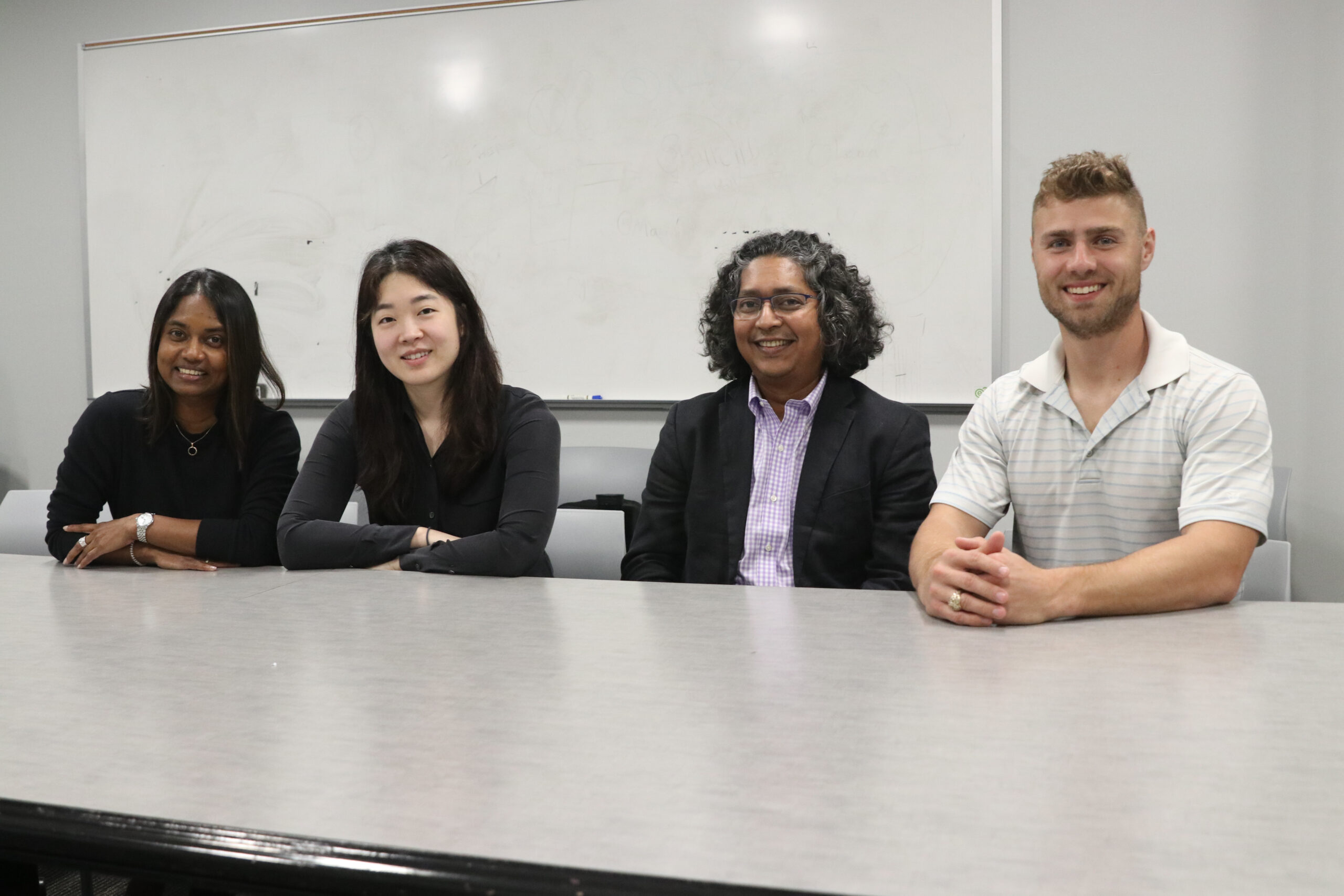
Ph.D. Degree Program
Pursue an academic career in teaching and research or a professional career in industry or government.
Application Requirements
Graduate Admission to Grady College’s Graduate Studies is a collaborative process involving Grady’s College Graduate Office and the University of Georgia’s Graduate School. Grady College has an Office of Graduate Studies that serves as a liaison between Grady College and the UGA Graduate School. To be considered for admission to a Grady graduate program you must first complete and submit your application to the UGA Graduate School.
Application Materials Required by UGA Graduate School
Go to the Application to Graduate School website.
Complete their application and upload the following required materials:
- Undergraduate and, if you have them, previous graduate school transcripts.
- The GRE is optional for both MA and Ph.D. applications. It is not required.
- For international students, you may need to provide a TOEFL, IELTS, or Duolingo language proficiency examination score. Click here to find country-specific requirements.
- Three letters of recommendation.
- Two to three-page-long Statement of purpose.
- Current Résumé/CV
Application Materials Required by Grady Graduate Studies Office
Email these materials to anne.hurne@uga.edu:
- Supplemental application to Grady.
- Ph.D. program applicants need to provide a writing sample.
- MFA Narrative Media Writing applicants to provide 20-page writing samples.
UGA Graduate School Application Deadlines
- Ph.D. program application deadlines: All application materials must be submitted to the UGA Graduate School by January 1 for Fall semester admission consideration. All application materials must be submitted by November 15 for Spring semester admission.
- Masters in Journalism and Mass Communication program application deadlines: All application materials must be submitted to the UGA Graduate School by March 1 for Fall semester admission. All application materials must be submitted by November 15 for Spring semester admission.
- Emerging Media Master’s program deadline: All application materials must be submitted to the UGA Graduate School by March 1.
- MFA in Film, Television, and Digital Media program deadline: All application materials must be submitted by February 15.
- MFA in Narrative Nonfiction Writing program deadline: All application materials must be submitted by April 1.
International Applicants
International applications have specific requirements for academic records, proof of degree, US degree equivalencies and English language proficiency. In lieu of academic records, applicants can submit credential evaluations from World Education Services (WES).
Frequently Asked Questions for Prospective Students
Many of your admissions application materials will be submitted online to UGA Graduate Admissions (e.g., application for admission, transcripts, resume, letters of recommendation, and statement of purpose). If offered admission, official transcripts should be sent electronically from your institution or mailed. The application process begins by submitting your application and materials to the UGA Graduate School, at their website Graduate Studies website.
Next, you should visit the Grady College graduate application webpage, complete a copy of the Grady Supplemental Application and email it to anne.hurne@uga.edu.
Both the UGA Graduate School and Graduate Studies Office of Grady require the submission of specific admissions documents for the PhD and MA degree. The Grady College MFA degree has different requirements. See the MFA Narrative Media Writing webpage or the MFA Film, Television and Digital Media website for more information about those degrees.
Upload the following items to the Graduate School: (1) completed application form, (2) all transcripts (from every institution of higher learning at which you were enrolled; for even one course), (3) current resume, (4) Three letters of recommendation (completed via email after you submit your recommenders email addresses. Ph.D. candidates should submit 3 former professors as recommenders), and (5) a 2-3 page Statement of Purpose (SOP). The SOP should provide information about your educational background and interests, your reasons or interests in pursuing a graduate degree in a journalism or mass communication area, and the reasons Grady College’s graduate program is a good match for you and your professional, academic, or research interests.
A small number of competitively awarded graduate assistantships are available to admitted MA students. These assistantships usually involve 13 hours of work per week for the 9-month assistantship period, with most assignments being teaching or research assistants. These assistantships provide a monthly stipend (with 10 monthly payments) and a reduction of tuition to $25 per semester. These are renewable for up to two years based on academic and job performance. MA assistantship awards often involve a competitive application and selection process, where interested students submit a cover letter and resume in response to a provided assistantship opening.
If you wish, you can apply for assistantship consideration when you complete the Grady College Supplemental Application. This form lets us know that you would be interested in being considered and enables us to send you graduate assistantship position announcements
While we accept applications from students enrolled in graduate programs at other universities, we do not transfer credits from other graduate programs or accept transfer credits from other institutions. If you wish to do your graduate study at UGA, you must start at the beginning of your MA degree program coursework to complete your degree here.
Students admitted from another UGA MA degree graduate program may be allowed to use two graduate courses to satisfy cognate requirements. The decision is up to your advisor and/or major professor.
The length of the MA degree program will depend on your undergraduate degree and the courses taken to complete that degree. In general, however, the MA in Journalism and Mass Communication is designed to be a two-year program, while the MA in Emerging Media is designed to be a three-semester program, which includes a summer semester.
It takes from three to five semesters to finish most of our MA degree programs assuming registration for a full-credit load in the fall and spring semesters. A limited number of graduate courses are offered in the summer semester, and summer semester courses are required for our Emerging Media MA degree. A full-credit load is 12 hours or more, which is typically three to four courses per semester. Thesis track MA students usually spend three to five semesters taking courses and writing a thesis; the typical MA non-thesis student spends three to four semesters taking courses.
The simple answer—one involves writing a thesis, while the other involves taking an additional course.
The thesis-track MA degree requires the successful completion of nine graduate courses (27 credit hours) and the successful completion and defense of a thesis (three hours) (30 total credit hours). The thesis-track MA is intended primarily for students interested in conducting original scholarship in a particular area of interest or who are planning to undertake further graduate study.
The non-thesis MA degree requires an additional three-credit hours of coursework relative to the thesis-track MA (11 courses or 33 credit hours). The non-thesis MA degree is designed to further increase students’ understanding of media and mass communication theories, processes and effects and to provide advanced preparation for communication careers in advertising, journalism, health and medical journalism and public relations or for further graduate study in communication-related fields.
The Emerging Media Masters (EM) degree program focuses on the intersection of communication technology and design, allowing individuals to explore the roles and applications of emerging media across an array of disciplines and careers. Designed to accommodate students and professionals from a variety of backgrounds and industries, this program is intended for individuals who wish to further personal career goals and those of their employers by gaining more knowledge and experience in emerging media and innovative technologies.
The EM concentration requires 11 courses (33 credit hours, 3 credit hours per course) and can be completed in as few as 3 semesters beginning in Summer. Students must earn a 3.0 (B) in required and elective courses. Only courses on the 6000, 7000 and 8000 levels count toward graduation.
The Emerging Media MA degree can be done as a residential (i.e., in-person) or online program. More information about the EM degree and its requirements can be found on the New Media Institute website.
Grady College offers these areas of concentration: advertising, journalism, health media and communication, journalism, mass media studies, and public relations. An integrated advertising/public relations concentration is offered to students with a Grady College undergraduate major in advertising or public relations. In addition, Grady College has an Emerging Media (EM) Masters degree program, along with a low-residency Master of Fine Arts (MFA) program in Narrative Media Writing and an MFA in Film, Television, and Digital Media.
You should note that concentrations are not majors. If you enroll in the MA program, you will receive an MA degree in Journalism and Mass Communication.
It is not necessary to have a JMC degree. Many of our students have undergraduates degrees in other areas and majors — from the humanities to the physical sciences — but do quite well in our program. When it comes to applying to our MA programs, we consider your undergraduate grade point average, your letters of recommendation, and your Statement of Purpose for information about your experiences, motivations, and career goals.
The simple answer — one involves writing a thesis, while the other involves taking an additional course.
The thesis-track MA degree requires the successful completion of 9 graduate courses (27 credit hours) and successful completion and defense of a thesis (3 hours) (30 total credit hours). The thesis-track MA is intended primarily for students interested in conducting original scholarship in a particular area of interest or who are planning to undertake further graduate study.
The non-thesis MA degree requires an additional three-credit hours of coursework relative to the thesis-track MA (11 courses or 33 credit hours). The non-thesis MA degree is designed to further increase students’ understanding of media and mass communication theories, processes, and effects and to provide advanced preparation for communication careers in advertising, journalism, health and medical journalism, public relations or for further graduate study in communication related fields.
The length of the MA degree program will depend on your undergraduate degree and the courses taken to complete that degree. In general, however, the MA in Journalism and Mass Communication is designed to be a two-year program, while the MA in Emerging Media is designed to be a three-semester program, which includes a summer semester.
It takes from 3 to 5 semesters to finish most of our MA degree programs assuming registration for a full-credit load in the fall and spring semesters. A limited number of graduate courses are offered in the summer semester, and summer semester courses are required for our Emerging Media MA degree. A full-credit load is 12 hours or more, which is typically 3-4 courses per semester. Thesis track MA students usually spend 3 to 5 semesters taking courses and writing a thesis; the typical MA non-thesis student spends 3 to 4 semesters taking courses.
An additional semester or additional courses may be needed if a student’s undergraduate degree work did not include prerequisites for Grady graduate courses. For example, MA students without undergraduate courses in journalism, advertising, public relations, or mass communication-related areas will most likely have to take prerequisite courses, which will require additional time.
For planning purposes, it is best to think about the MA as a two-year degree program.
While we accept applications from students enrolled in graduate programs at other universities, we do not transfer credits from other graduate programs or accept transfer credits from other institutions. If you wish to do your graduate study at UGA, you must start at the beginning of your MA degree program course work to complete your degree here.
Students admitted from another UGA MA degree graduate program may be allowed to use two graduate courses to satisfy cognate requirements. The decision is up to your advisor and/or major professor.
Yes, there is an application fee. The application-processing fee is collected to help offset the cost of processing application materials. The fee is non-refundable and cannot be deferred or credited toward tuition. As of July 1, 2009, the fee to apply for graduate programs at the University of Georgia is $75 for domestic applicants and $100 for international applicants. If at all possible, you should pay by credit card as soon as you submit the application. Applications are not reviewed until you have submitted and paid the application fee. If you must pay by check or money order, please email gradadm@uga.edu for further instructions.
Deadlines for admissions purposes are the dates by which your application file, with all needed materials, should be complete and submitted to the University of Georgia Graduate School. Applications can be completed and submitted in advance of the deadlines.
For admission to the MA program, it is recommended that your application be completed and submitted by March 1. For admission to the MFA program, it is recommended that your applications be completed and submitted by April 1.
In general, it is not possible to waive the application fee for applying to Grady College graduate programs, particularly for international applicants. The UGA Graduate School has a list of programs under which it is possible to apply for application fee waivers. This can be found at https://grad.uga.edu/admissions/application-fee/
Applicants whose primary language is not English may need to submit official TOEFL or IELTS scores that are not more than two years old. Applicants who have received degrees from accredited institutions in the U.S. or from institutions in countries where English is the primary language (e.g., the United Kingdom, Australia, New Zealand) usually are not required to submit the TOEFL (or IELTS) scores. The UGA Graduate School Admissions English Proficiency Requirement Policy can be found here:
https://grad.uga.edu/admissions/requirements/international-applications/english-language-proficiency-
requirement/
Country-specific requirements regarding English Proficiency requirements can be found here:
https://grad.uga.edu/admissions/requirements/international-applications/country-specific-requirements/
Grady College does not require applicants to provide GRE scores, but applicants can do so if they would like. We do not accept nor use GMAT or LSAT scores for the application and admission process.
You are responsible for checking the progress of your application. Once your application has been accepted by the UGA Graduate School, you will receive an email from gradadm@uga.edu with a link to the Check Application Status portal. You will login with the email and password you used to create the application.
You are encouraged to submit your application in advance of the deadline. You should be aware that letters of recommendations, transcripts, and test scores will usually arrive at UGA a few weeks after you request that they be sent to us. A completed application file by January 1st can only be assured in two ways: (1) getting all admissions materials to us before January 1 (for PhD), March 1 (for MA), or April 1 (for MFA) and (2) using the UGA Tracking System to monitor your application.
Most MA program students are admitted for fall semester entry, but it is possible to start the MA in Journalism and Mass Communication degree program in spring semester. This often happens with Double Dawg students who finish their undergraduate studies in December and return in January as graduate students. All Emerging Media Master’s students start their program in the summer.
The University of Georgia Graduate School policy states that applicants are eligible for a one-time move of their start date without filing a new application and application fee. Requests should be made in writing to gradadm@uga.edu. Please contact Graduate Admissions no earlier than 13 to 14 months before the month that your anticipated new semester of enrollment is to begin.
According to the University of Georgia Graduate School policy, you must reapply, following the same procedure and submitting the same admission materials.
More information on University of Georgia graduate program application deadlines can be found at https://grad.uga.edu/admissions/application-deadlines/

Double Dawgs
Double Dawgs is an initiative that encourages undergraduate students to start planning for their master’s degree while they are still in school.
Dr. Glen Nowak
gnowak@uga.edu
(706) 583-8268
Journalism Bldg, 207 Dean’s Suite
Jeff Springston
jspringston@uga.edu
(706) 542-7833
Journalism Bldg, Room 201-B
The Latest
Read the newest headlines, get updates and discover events happening at Grady.

Grady InternViews: Amanda Whylie
This is part of a series where we ask Grady College students to describe their internship experience. Amanda Whylie is a fourth-year entertainment & media studies student working at Omnicom […]

Remembering Ruthann Lariscy
Ruthann Lariscy was the type of friend who celebrated birthdays of colleagues deployed overseas by shipping them a party-in-a-box, complete with a birthday cake. She was the type of professor […]

Grady InternViews: Melanie Levi
This is part of a series where we ask Grady College students to describe their internship experience. Melanie Levi is a fourth-year journalism student working with Fox News Channel as […]
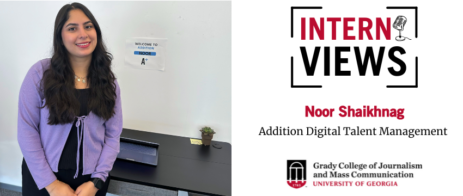
Grady InternViews: Noor Shaikhnag
This is part of a series where we ask Grady College students to describe their internship experience. Noor Shaikhnag is a fourth-year entertainment & media studies and communication studies student […]

Grady InternViews: Ryan Langner
This is part of a series where we ask Grady College students to describe their internship experience. Ryan Langner is a fourth-year advertising student working with Apple as a Partner […]
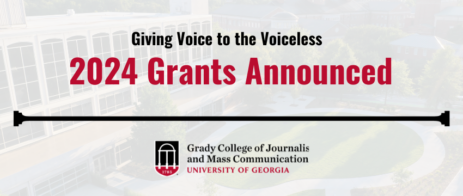
2024 Giving Voice to the Voiceless grants announced
Projects that use music to benefit dementia patients, help Atlanta public school students express their identities and provide an outlet to combat name-based discrimination in science are just a few […]
Events

Tommy Tomlinson Book Reading & Signing
Join Tommy Tomlinson for a book signing session and a reading of his book, “Dogland” at 6 p.m. on July 31, 2024.

Philadelphia Alumni Event
Save the date to join Dean Davis and other alumni for our Grady College networking event in Philadelphia during the AEJMC Conference. Reserve your spot here by August 1.

Grady College Welcome Back Fall 2024
Welcome to our new and returning students! Celebrate with snacks, refreshments and activities on the Schnitzer Family Media Lawn from 10 a.m. to 4 p.m. each day!
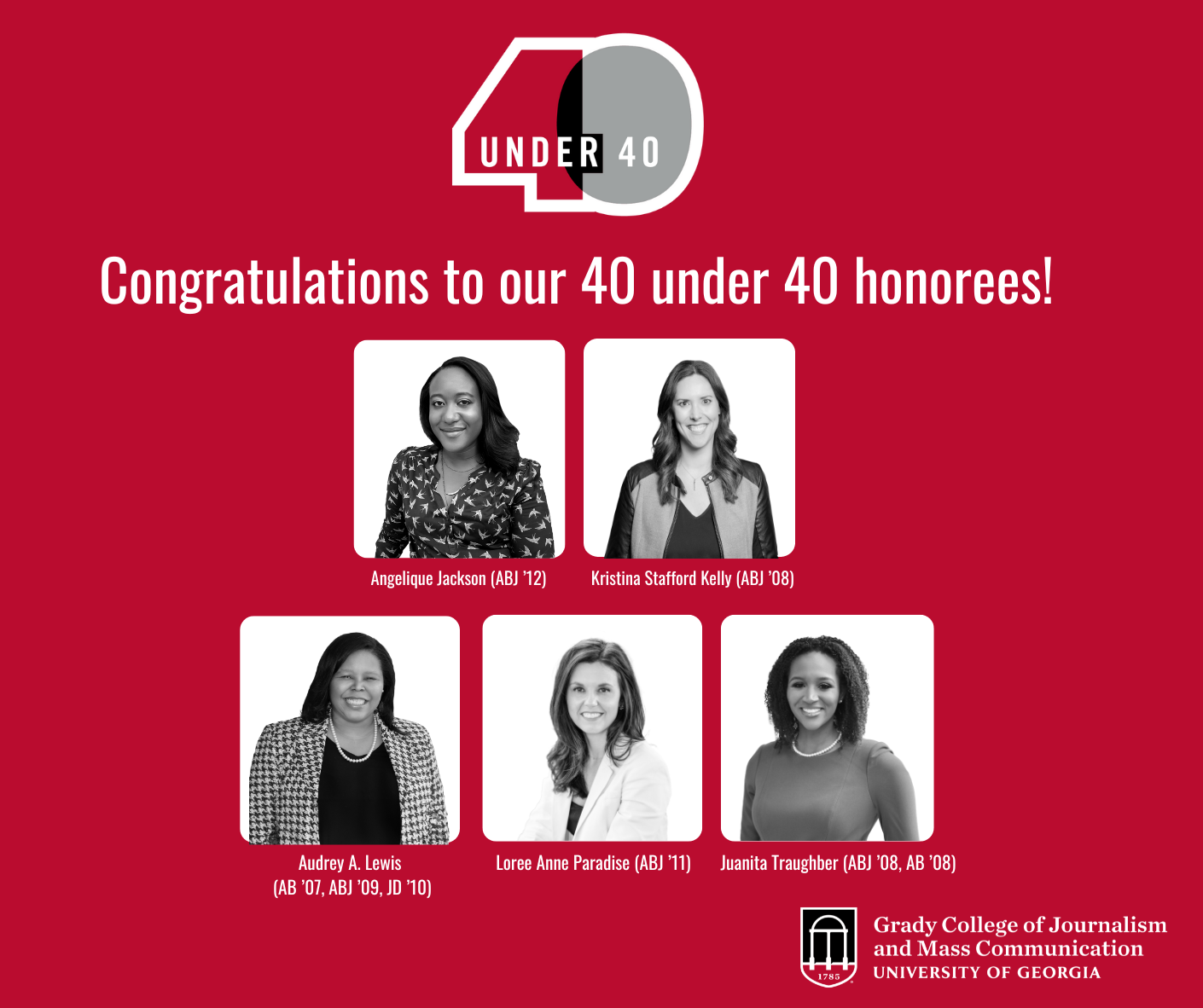
UGA 40 Under 40 celebration
A panel discussion featuring Grady College’s 5 40 Under 40 honorees will be held on September 6, 2024 at 10 a.m. in the Peyton Anderson Forum.
Fall Alumni Board Meeting
Save the date for the fall 2024 Alumni Board meeting. More details will be announced closer to the date.
Maxine Clark Lecture
Join Maxine Clark (ABJ ’71) on September 16, 2024, for a preview of the film “Unstuffed: A Build-A-Bear Story.”

Perspectives
“I want to be a great storyteller and journalist. I knew that Grady is the best of the best, therefore I felt as though it was only right to join the UGA community.”
Riley Armant
MA ‘22
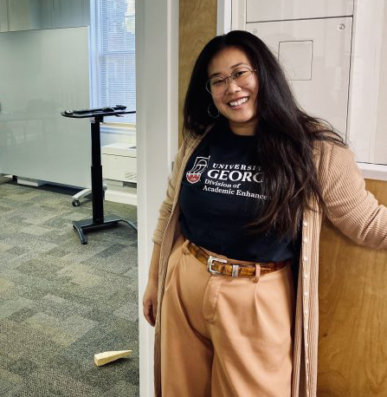
Perspectives
“I knew that Grady was the perfect program to dive deeper into media communication research that would complement my knowledge in interpersonal communication. I am so grateful to be here because I continue to learn from and work with the top scholars dedicated to this research.”
Farrah Youn-Heil
Current PhD Student

Perspectives
“While I have worked in journalism for 30 years, I never did study it at a collegiate level, but . . . I decided there was no better place to get training in that field than at Grady.”
Eduardo Morales
Current MA Student
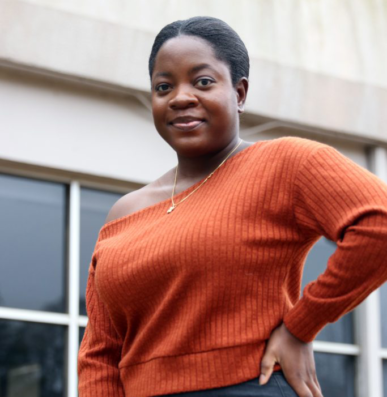
Perspectives
“The highlight of my doctoral education has to be the unending access to like-minded individuals. With my time spent in Grady, I truly believe that there are individuals always willing to assist and answer questions. In my opinion, this makes the entire academic journey much more pleasurable.”
Rhoda Olaleye
PhD ’23

Perspectives
“Since coming to Grady, I have had the opportunity to collaborate with several faculty members on research projects that are in various stages of development. The faculty here really want you to engage in research and take the lead on projects, and the program facilitates those connections for you so you are able to start researching right away.”
Leslie Klein
Current PhD Student